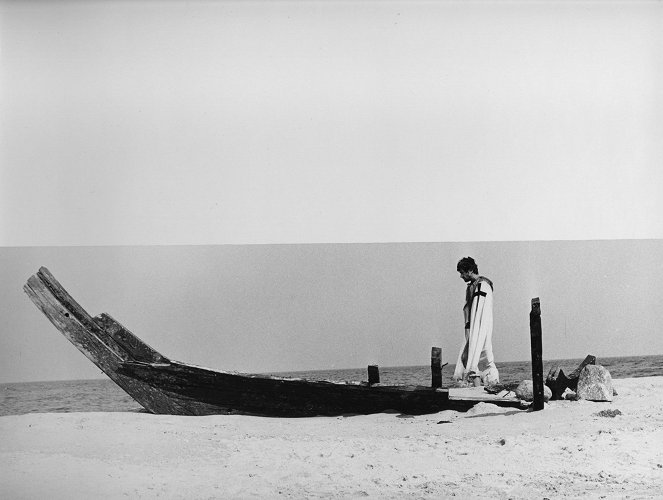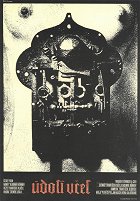Regie:
František VláčilKamera:
František UldrichMusik:
Zdeněk LiškaBesetzung:
Petr Čepek, Jan Kačer, Věra Galatíková, Zdeněk Sedláček, Zdeněk Kryzánek, Jana Hájková, Michal Kožuch, Ladislav Gzela, Petr Štěpánek, Josef Somr (mehr)Inhalte(1)
It is the second half of the 13th century. The widowed master of a yeoman's stronghold, Vlkov, marries young Lenora. His twelve-year old son from his first marriage, Ondřej, gives his future "mother" a basket as a wedding gift with bats hidden among white flowers. The father, blinded by fury, flings the boy against a wall. Kneeling over the bleeding limp body, he then prays to the Virgin Mary, begging for the boy's recovery and promising he would give Ondřej to her service. The recovered boy is then taken to the North, to a castle, which is a site of a powerful crusader's order, its members eschewing women as well as all other profane temptations. Ondřej is befriended by Armin von Heide, an ascetic and fanatic who exaggerates the abstention almost masochistically. Years pass and Ondřej has become an adult. In the time of fasting, the order knight Rotgier escapes from the castle and Armin pursues him with the other men. Ondřej runs into the refugee by accident and their rushed talk ignites desire for freedom in him as well. Although Rotgier is caught and killed by a pack of hounds, Ondřej, too, decides to run away. He reaches as far as to Vlkov stronghold, where the widowed Lenora lives. The two people become close and decide to marry. Armin, following Ondřej close upon his heels, sneaks around the stronghold and enters it on the very wedding day. Lenora does not want to chase the unknown guest away and even kisses him in a friendly manner. In the evening, the fanatical man invades Lenora's bedroom and cuts her throat. Ondřej lets him be worried to death by dogs and he penitently returns to the site of the order. (Verleiher-Text)
(mehr)Kritiken (8)
Meiner Meinung nach ist Das Tal der Bienen wirkungsvoller und möglicherweise auch gelungener als Marketa Lazarová – vielleicht auch deshalb, weil der Film einfacher zu verstehen ist, weil sein Drehbuch nicht "verschlüsselt" ist (man merkt, dass die Monologe und Dialoge Vladimír Körner geschrieben hat) und weil man das Handeln der Figuren gut verstehen kann. Petr Čepek ist absolut großartig, Jan Kačer dämonisch… Am meisten ist mir aber trotzdem Josef Somr in einer kleinen, aber wichtigen Rolle ans Herz gewachsen. Die Musik von Zdeněk Liška ist wie immer wunderschön. Es hat keinen Sinn, Vláčils Regie in den Himmel zu loben, weil sie längst dort ist. Ein hundertprozentiger Film.
()
Bergman tschechisch? Zumindest nehme ich das so wahr, denn Vláčils düstere und schmutzige Vision des Mittelalters bringt ihn dem schwedischen Genie sehr nahe. Genauso wie die Zeremonie von Geste und Wort, das Gewicht eines einzigen Bildes, das scheinbar nichts sagt und doch mit jedem Detail spricht. Körners Drehbuch ist meisterhaft konstruiert und baut Stein für Stein eine Treppe zur finalen Tragödie auf, die aus der fast harmonischen Feier des mittelalterlichen Heidentums hervorgeht. Čepek, Kačer und andere Schauspieler aus dem Theater "Činoherní klub" verliehen der Geschichte einen Hauch von Theatralik, Langsamkeit, Betonung jedes Wortes und jeder Handlung. Zdeněk Liška bestätigte erneut, dass er ein außergewöhnlicher Komponist ist, wenn auch manchmal in einer seltsamen Rolle: Seine weltliche und religiöse Musikbegleitung unterstreicht präzise das leise summende Drama über die zwei Seiten des Glaubens. Obwohl The Valley of the Bees von der Tschechoslowakischen Neuen Welle gnadenlos zertrampelt wurde, bewies es mit der Zeit die Dominanz einer komplexen künstlerischen Aussage über das zeitgenössische Filmexperiment. Bei allem Respekt vor Neuer Welle, das ist einfach eine Klasse höher.
()
The story of a religious fanatic who does not hesitate to take up the sword for the glory of God and for whom the desire for a normal life is alien. It is hard to believe that this film was made mainly to use the costumes from Markéta Lazarová. The Valley of the Bees is equally exquisite, oozing the atmosphere of the 13th century, and Zdeněk Liška's music is unique as always.
()
The Valley of the Bees is a deeply philosophical movie. It is also very oppressive and impersonal, suppressing all emotions and feelings that a film could arouse in the audience. The result is that The Valley of the Bees is a perfect, raw depiction of the Middle Ages, the likes of which would be hard to find in Czech cinematography. And even though it lacks emotions, it is definitely a film that you must not miss, because it will convince you that all kinds of things used to be shot in Czechoslovakia in the past. And they had success with the audience then, so why shouldn’t they be appreciated today?
()
“My father promised me to the Order. To save his soul." If it weren’t for Herz’s year younger The Cremator, The Valley of the Bees would sit on the imaginary throne of Czechoslovak cinema. This way it is doomed to second place, but what can you do... And that shows amongst other things that I belong to the “barbarian riffraff" who consider this, Vláčil’s picture to be better than Marketa Lazarová (which is a bit of a paradox since The Valley of the Bees was only made to make use of the costumes and scenery left behind after it). The Bergmanesque proportions, the indescribably splendid camerawork (I will probably never get bored of the shot at the end with Ondřej disappearing into the darkness) and Liška’s score make watching this a wonderful experience for the mind, eyes and ears. And the actors are absolutely... We don’t see Petr Čepek on screen, but Ondřej of Vlkov. Nor do we see Jan Kačer (who currently stars in an awful Czech telenovela), but purely and simply Armin von Heide. The same applies for the others. OK? OK!
()
Galerie (28)
Photo © Filmové studio Barrandov / Jan Kuděla


Werbung